Wednesday, December 31, 2003
HAPPY NEW YEAR
As the year fades, a few images in pale blue.
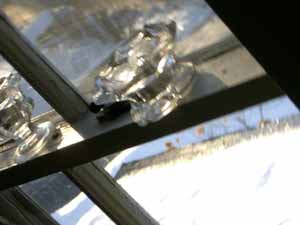
I'm uncharacteristically at a loss for words. This year is impossible to quantify, sum up, encapsulate. For me, it has been the Year of the Blog; that, and you, have been the central adventure and discovery. But, vodka martini in hand, I find no words available in which to wrap these experiences. there is only the awareness of that citrus zest that changes the mundane into the memorable, the mysterious.
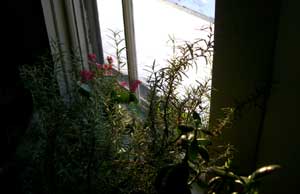
We're about to place a call to Reykjavik where our quite wonderful Icelandic next-door-neighbors are celebrating the New Year five hours ahead of us. I think of Jenny and Geoff in Australia; Yuan in Beijing; Nancy in India; Mark in Bonn; Mary in Scotland...Wherever you are, Happy New Year. May it be truly happy, filled with both peace and delight.
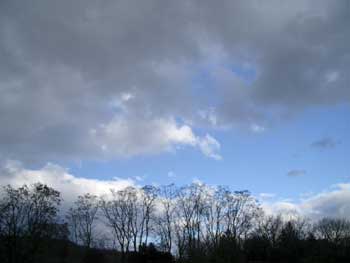
6:48 PM
|
Monday, December 29, 2003
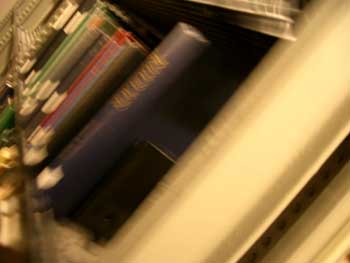
I felt stir-crazy today. Wanted to go somewhere. But that wasn't going to happen, so instead I went to the library and got books about far-away places. I'm sure I'll enjoy the books, but what was restorative today was being in the stacks. I love it there - the dust on the black shelves beyond the sliding metal bookends, the dim light until you press the switches for the timed fluorescents, the colors of the spines, and most of all the foreign languages: country after country, worlds upon worlds just waiting to tell me their stories. If only I could read all those languages! Instead I'm grateful for translations, and run my fingers wistfully along the titles that have received no such attention and remain enigmatic behind their covers and their strange alphabets.
Today three books came home with me: The Winter Queen, by Boris Akunin; The New Life, by Orhan Pamuk; and Jose Saramago's The Cave. That should do it for a while.
After I got home, J. suggested we watch a DVD he had rented, a German movie titled "Mostly Martha", about a female chef. It was marvelous, but when it finished at 7:00 pm, having watched incredible food being prepared for two hours, I said, "OK, we're going to the store." At nine-thirty we sat down to a dinner of pasta with pesto and sauteed zucchini and red bell peppers, veal marsala, and salad, followed by coffee and cannoli. Lest you are wondering, this is not the usual fare around here, but sometimes you have to seize the moment (and the saute pan). Now I'm glad I can curl up under the comforter with my books.
See that movie if you can.
10:35 PM
|
Saturday, December 27, 2003
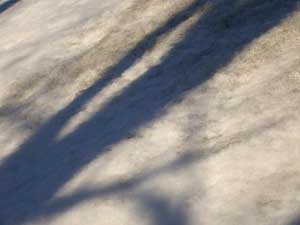
I wish I had taken a picture yesterday, for the second day of Christmas, of not just two, but about twenty-two mourning doves arranged in our trees and at the foot of the bird feeder. There is one pair, inseparable, who seem to be "resident" in the back yard, and the others come as visitors, ornamenting the bare branches of the tall cherry tree and keeping up a constant cooing and characteristic whooo as they fly. Actually, now that my mind is running, I wish I had thought to do a "Twelve Days of Christmas", country-style: we could have begun with a great picture of a wild turkey in an oak tree that J. took in the mountains the other day. Instead, you are getting arty shadows on snow!
In truth, I am delaying. Tonight we're invited to an engagement party for the daughter of old friends. It's supposed to be fancy, and I ought to be figuring out what to wear, but I'm reluctant to paw through my closet. My choices are rather limited: a black top and skirt (or pants) with the nice rust-red-and-gold Indian shawl that's usually on the back of the sofa; the same top and pants with a dark blue velvet embroidered-and-mirrored jacket I bought in an Indian import shop in London years ago; a Moroccan djellebah, black with white embroidery, inherited from my mother-in-law; or my Betsy Johnson tight silk charmeuse pants with a similarly-colored matte silk shirt. I'm leaning toward the latter, but I'm afraid to put the pants on, and it's so damn icy everywhere I'm afraid I'll kill myself if I wear heels.
The usual drill is for people to show up at winter parties wearing their Sorels and L.L. Bean boots, which get left by the door and switched for dress shoes; and layers of coats, to be piled haphazardly onto beds, along with babies and small children as the night wears on. It's great if you haven't already had to hike in up a long driveway or dirt road. This party, fortunately, is in town.
You may shake your heads, city-dwellers, but glamour in these parts generally arrives with a sidekick: humor.
4:08 PM
|
Friday, December 26, 2003
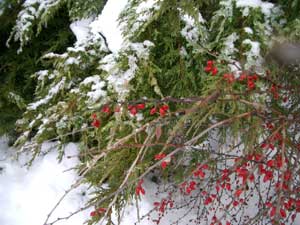
Well, Cassandra got a very nice Christmas present – a tiny digital camera of her very own. I’m looking forward to exploring the creative potential of this marvelous device and being able to show you more of my environment -- like these barberries that grow outside my front door.
We spent a quiet day yesterday with J.’s family after getting home very late from the Christmas Eve service at church. Both the Lessons & Carols service and the midnight Eucharist were moving and beautiful this year. Afterwards I thought about them, as I often do, from the perspective of one who is part of the “giving” aspect for the people who show up just on Christmas or Easter, expecting…what? That’s what I ponder. Within the larger community, our church is seen as providing a “real experience of Christmas”, whatever that is. People come to hear the familiar music, to see the candles and the greens and the poinsettias, to hear the story read aloud; to be touched, to remember.
Before every service in our church, the clergy, acolytes, lay Eucharistic ministers, and choir gather in the parish hall to recollect ourselves in silence for a few minutes, and to briefly pray together. We all know that there are people out in the sanctuary who have come for a hundred reasons, known and unknown, and that there may be someone for whom today’s experience is crucial. I always think of that anonymous person, wondering and wishing I could do more to give them the love or comfort, strength or help they are seeking, but I know this is not entirely up to me. Still I hope that they will find some of these things, as I have, in that place.
Coming up the aisle with the choir on the processional hymn for the Lessons & Carols service, I saw many unfamiliar faces in the packed church, some shining with an almost childlike wonder. They looked happy to hear the music, the full organ, to see the crosses and torches, the long lines of robed singers, but these faces were also expectant. What did they hope for? When I could, I tried to meet an eye with my own, to give a little smile and show some joy and welcome instead of mere concentration on the music.
People usually respond with a little flicker of their own eyes and lips. We meet thus for only a second in time. I never know; it seems like so little, but maybe, maybe it’s just barely enough.
Some virtual gifts I was happy to receive in the past couple of days:
A Story of Heaven and Hell (John’s Dharma Path)
Moonlight Water Garden (also via John’s Dharma Path)
A brilliant little essay on consumerism by maria at alembic, cleverly titled “The Mallpractice of Ecomomics”
Butuki wrote meaningfully about the private difficulties of this season, as well as its joys, and I sent him a reply that I want to copy here, since it pertains to all of you:
Even those of us who are surrounded by snow and the semblance of Christmas loveliness have our private sorrows and inner struggles. I, too, keep the depths of my private life out of my blog... In some ways, that's probably not helpful because it may give the impression sometimes that "I'm OK" while others are not feeling OK. Actually I think nearly all of us in this community are prone to depression, self-analysis and criticism, and are highly sensitive to the world and vulnerable to its pain as well as our own. The fact that we come together is a gift, and while we can't hug each other or sit down over coffee or walk in the woods, it IS real friendship, just of a new kind. I'm very grateful for yours!
3:40 PM
|
Thursday, December 25, 2003
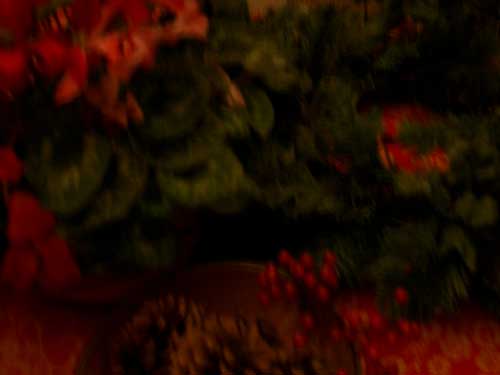
MERRY CHRISTMAS to all from Cassandra
11:09 PM
|
Tuesday, December 23, 2003
Just updated my Book Notes.
8:40 PM
|
Strange...just as many readers are coming here, but nobody is commenting. Are other people noticing the same thing? Are we all stressed?
Today I made a lino cut, the first print I've made in ages. Actually, I made the block but didn't print it. There are problems. And I cut myself - of course, I always do - but superficially. Ahhh. Sigh. It feels so good to do some real art, with my hands and not PhotoShop, and it's so impossible to do really good art when you don't do it often. But that's OK, today I was grateful for the process and the unfolding of the work under my fingers.
While I was working downstairs in my studio, the piano tuner was working upstairs. He likes working on my Schimmel upright, and I like him. Afterwards we sat and talked for a little while about his adopted sponsor-son in Nepal, and about Montreal and Quebec City, and about the difficulties of practicing the piano when you aren't taking lessons. Now the piano is across the room, shining, and I think I will go play for a while, now that it is beautifully in tune, before the heating system and winter weather have their way again with its wooden body and metal synapses.
Meanwhile, I wish you could all be here to enjoy this white Christmas.
8:21 PM
|
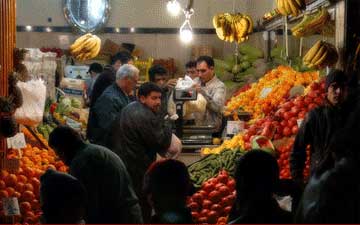
Tehran market, from tehran24
VIRTUES
I'm guest-blogging on "temperance" over at commonbeauty, where there is a series of posts on "the virtues". Take a look, and consider joining in - a few virtues are still up for grabs, and the vices will follow!
12:37 PM
|
Monday, December 22, 2003
Another from Milosz.
EARTH AGAIN
They are incomprehensible, the things of this earth.
The lure of waters. The lure of fruit.
Lure of the two breasts and long hair of a maiden.
In rouge, in vermilion, in that color of ponds
Found only in the Green Lakes near Wilno.
And ungraspable multitudes swarm, come together
In the crinkles of tree bark, in the telescope's eye,
For an endless wedding,
For the kindling of the eyes, for a sweet dance
In the elements of the air, sea, earth, and subterranean caves,
So that for a short moment there is no death
And time does not unreel like a skein of yarn
Thrown into an abyss.
Czeslaw Milosz
from Unattainable Earth, 1986
8:14 PM
|
Saturday, December 20, 2003

Stonehenge. Photo by J.
ECOTONE TOPIC: MYTHIC PLACE
Driving out of London, the detached brick houses and backyard garden plots gradually give way to countryside. Sitting on the wrong side of the little rented car, I watched out the window while my husband, happy in the left-handed world of British motoring, drove west. Lulled by the rhythm of the rolling grassy land - undulating, calm, with hardly a tree -I suddenly sat up, astounded. There it was, in the distance, rising all alone from the Salisbury Plain. My skin contracted into gooseflesh.
This was more than twenty years ago. When we finally arrived at the site, we parked in a lot that had been cleverly designed to the left and below the highway, so that buses and cars would be largely out of sight when you were viewing the stones themselves. We also arrived in the days when you could walk right into the circle of stones. To our surprise and relief, there was no American-style souvenir shop, full of plastic monuments sealed in snow-globes, or reproduced as inflatable life-size replicas. You just walked up some steps, onto a gravel walkway set into the grass, and there you were.
It was a grey, misty English day: perfect for seeing this place that I had wanted to visit my entire life. I hadn't known what to expect; what the scale would feel like, or how the site was situated in real life, not just in pictures; whether it would have power once I actually stood there. And to this day, I can't really describe what I felt. I remember that the stones weren't as big as I had thought they might be, but feeling dwarfed by their massiveness as much as their height. I remember the quiet, and the strangeness that emanated from the juxtaposition of the vast horizontal plain, and these sudden, standing stones, arranged in a way that felt both supremely human, and supernatural. I felt like a visitor in a place I didn't understand, but ought to, on some long-forgotten level. I remember wonder, awe, and mystery, and the sense of a tenuous line stretching from myself back into ancientness, beyond the power of any tools I could summon, beyond language, experience, or reason.
As we stood there and moved around the stones, we heard a low thumping in the earth, far away, and then the unmistakable rumbling of airplane engines. Low on the horizon and then quite near, flew a large military transport plane. We watched as this plane, and then another, and another, moved ponderously in the grey sky through the voids between the stones, while the deep thumps of test-bombing continued in the distance.
It was 1982, during the Falklands conflict, and Maggie Thatcher had the RAF at the ready. Strange. When my father had heard we were going to Salisbury, he told me about being stationed nearby on maneuvers before crossing the channel during the Normany invasion, and how he had once driven his tank through the cobblestone streets of the medieval city. I watched the planes, and thought about him.
We left the site and continued on to the city of Salisbury, where the spire of the cathedral also rises above the landscape. We walked up the same cobblestone streets my father remembered, crossed the cathedral grounds, and entered. The interior was cold, stony, damp…and lovely in the early afternoon light. We walked around quietly, reading about the site's Norman origins, and the cathedral’s founding in 1220. There were ancient woolen banners above our heads - tattered and faded - and the sign beneath told us, incredibly, that they had been brought back from the Crusades. Nearby, the effigy of a Crusader knight lay above his tomb, and close to him, the body of a Saracen who had been brought back from the Middle East. So not much had changed. My husband and I looked at the tombs, and then at each other.
"My relative," I said.
"And mine," he replied.
Read other responses to "Mythic Place" at the Ecotone Wiki.
5:46 PM
|
Friday, December 19, 2003
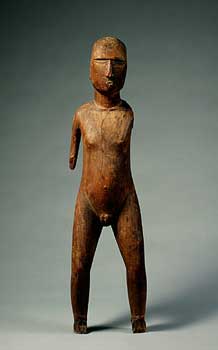
AFRICAN ART, 2:00 a.m.
Maybe we blogging insomniacs should establish a 2:00 am chat room. I was owl-ish last night, up on the couch in the living room/library, surrounded by books but unable to sleep. My usual pattern, if I'm going to be restless, is to sleep three or four hours, then be awake for one or two, and finally go back to sleep. Sometimes I use the laptop, but more often I try to meditate, or read. Last night I delved into a book on African art that I bought a few years ago at MOMA: CloseUp: Lessons in the Art of Seeing African Sculpture.
I've looked many times at the stunning photographs in this book, but never read the accompanying essays. Last night I read the first one, by the book's highly-accomplished photographer, Jerry Thompson, who talks about how he "sees" these sculptures:
My knowledge is on the level of servant's gossip - overheard conversations of curators and anthropologists, plus what I have been told in order to make the needed pictures. I know from experience that no amount of careful looking can supply basic information that is lacking...on the other hand, no amount of information can substitute for close looking.
Thompson, however, knows a great deal. He speaks about how we have gotten to such a point of subjectivity in our Western way of "looking", and yet tries to bridge the inevitable gaps by going to the heart of the emotional response many of us have to African art:
These figures seem to be about something they have some kind of content which, whether threatening, reassuring, exhilarating, hostile, disgusting, or too unclear to be classified, has a hold, or exercises a power not on our formal or aesthetic sense alone, but on some deeper sense... Force may be seen as a power larger than the individual, power that comes form somewhere else and passes through the individual, even through the organs least involved with consciousness and will.
Yoruba Sculpture, a tour from the Met, gives an excellent introduction to African carving.
7:29 PM
|
Wednesday, December 17, 2003
Well, there is certainly no impetus to write about the weather here today - sleet and freezing rain on top of snow. I can hear J. outside, chopping channels in the ice so the driveway won't flood and form a skating rink.
So it's back to Milosz. The poems I'm reading and re-reading now are mainly post-1995, some quite a bit later, and they are poems of an elderly man who is looking back and remembering; looking for answers and often not finding any. He's sometimes preoccupied with memories of women he knew, women he loved, women he only saw for a moment, such as a singer in a cafe, but remembers vividly: "No trace of her or of that cafe/And only her shade with me, her frailty, beauty, always."
Of all his concrete memories - the wine and the food, the beaches and architecture - it seems to me that the memories of women are the most poignant. And as a woman, this gives me pause when I think back and wonder about how I might be remembered by men I've known. Men aren't always this honest, or this vulnerable, but I suspect that Milosz is revealing something more universal than I realized. Here is:
GATHERING APRICOTS
In the sun, while there, below, over the bay
Only clouds of white mist wander, fleetingly,
And the range of hills is grayish on the blue,
Apricots, the whole tree full of them, in the dark leaves,
Glimmer, yellow and red, bringing to mind
The garden of Hesperides and apples of Paradise.
I reach for a fruit and suddenly feel the presence
And put aside the basket and say, "It's a pity
That you died and cannot see these apricots,
While I celebrate this undeserved life."
Commentary
Alas, I did not say what I should have.
I submitted fog and chaos to a distillation.
That other kingdom of being or non-being
Is always with me and makes itself heard
With thousands of calls, screams, complaints,
And she, the one to whom I turned,
Is perhaps but a leader of a chorus.
What happened only once does not stay in words.
Countries disappeared and town and circumstances.
Nobody will be able to see her face.
And form itself is always a betrayal.
--Czeslaw Milosz
6:03 PM
|
Tuesday, December 16, 2003
A while back I was exploring the post-war Polish poets, and I've been thinking of getting back to that. Yesterday I got out my volume of Czeslaw Milosz, maybe subconsciously hoping to find something that would make sense of the bloodthirsty vengefulness of our world as it rubs its cold metallic hands against this season of peace. Maria at alembic was apparently thinking the same way, and she found a very apt expression of this weariness and lack of historical perspective in a poem of Zbigniew Herbert, which I commend to you.
Milosz has a lot to say, and like many of us he is not always consistent in how he views life. Toward the end of his collected works, there are two contradictory poems that he intentionally pairs because they represent this dual nature - the one a response to a woman who criticizes him for concentrating on beauty and finding meaning in the concrete reality presented to his senses at a particular moment. The other is a more inner, angry response to the brutality, suffering, and forgetfulness of the world.
The split felt very familiar.
Those poems are too long to quote here, but here are two short ones that lean toward the concrete:
DECEMBER 1
The vineyard country, russet, reddish, carmine-brown in this season.
A blue ouline of hills above a fertile valley.
It's warm as long as the sun does not set, in the shade cold returns.
A strong sauna and then swimming in a pool surrounded by trees.
Dark redwoods, transparent pale-leaved birches.
In their delicate network, a sliver of the moon.
I describe this for I have learned to doubt philosophy
And the visible world is all that remains.
IN COMMON
What is good? Garlic. A leg of lamb on a spit.
Wine with a view of boats rocking in a cove.
A starry sky in August. A rest on a mountain peak.
What is good? After a long drive water in a pool and a sauna.
Lovemaking and falling asleep, embraced, your legs touching hers.
Mist in the morning, translucent, announcing a sunny day.
I am submerged in everything that is common to us, the living.
Experiencing this earth for them, in my flesh.
Walking past the vague outline of skyscrapers? anti-temples?
In valleys of beautiful, though poisoned, rivers.
Czeslaw Milosz
3:32 PM
|
Monday, December 15, 2003
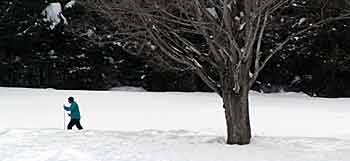
Cross-country skiing nearby
Thanks to all of you who commented on the last post about handling Christmas with sanity and grace. My true confession: I love Christmas, and always have. At the heart of the celebration are all the best characteristics of human beings: love, generosity, selflessness, joy. It's not the idea that's the problem, it's the implementation - but I was so confused about this that for a long time I thought I hated Christmas. We used to make most of our gifts (including elaborate sewing, knitting, baking, and woodworking projects), sent handmade cards with an original photographic print and a personal note, decorated our indoor tree with handmade ornaments and an outside one with popcorn and cranberry and peanut-butter-stuffed pinecones for the birds. We had the neighbors in for a get-together, organized caroling in the neighborhood for the elderly shut-ins, and sang in the choir at all the extra services, getting home at 1:00 am on Christmas Eve just to rise blearily the next morning and cook a big noontime dinner for the whole family. I'd often end up in tears, or get sick. Such a pile of beautifully-wrapped, non-commercial good intentions: it makes me exhausted just to think about them. And to think that we blamed our fatigue and burn-out on the prevailing commericialism in the society!
After realizing the holidays were making us miserable, for several years J. and I left the country at Christmastime, saving our pennies and flying to England where we spent a very quiet holiday in a London hotel, spending long hours in the British Museum and galleries, walking up Fleet Street to Evensong at St. Paul's, and often having a sort of camping-out Christmas dinner in our room.
During those weeks, I'd stand on the steps of the National Gallery as the sun set at 3:30 pm, gazing out over Trafalgar Square and the huge Norwegian Christmas tree with its lights sparkling in the falling dusk. The solitude and dislocation I felt were immense, but so was my sense of happiness in this city that became a second home, and my gratitude at being able to be somewhere else, knowing it was teaching me things I needed to learn. I saw that I had been trying to recreate the feeling of "perfect" Christmases of my childhood, to erase change and loss, to arrest time. I saw that my natural generosity and creativity had become somewhat confused with egotism and perfectionism, and that I'd become a slave to a list of "shoulds" that no one was imposing except myself. I realized that I could do less - a lot less - and be loved just as much.
Last night we had the first neighborhood Christmas party we've hosted in more than ten years, and it was a lot of fun. I bought most of the food instead of cooking for days. We don't have a tree; in fact the house is decorated with a few fake pine garlands with lights and pinecones, little feathered birds and red ribbons. It looks nice. Most people on our list are getting books as gifts, and I doubt if we'll be sending very many cards at all, now that we talk to everybody by e-mail throughout the year. I'm looking forward to singing, and to celebrating with our families and friends in a low-key way.
We had another big snowstorm last night. It's going to be a white Christmas.
4:33 PM
|
Friday, December 12, 2003
I'm feeling that first wave of Christmas fatigue...maybe it's the to-do list I just wrote out, or the baking projects waiting for me in the kitchen. Or the evergreen garlands that we've been walking over on the floor all week, instead of hanging up in the door and window frames. Or the packages downstairs that need to get mailed. I did get the shopping done early!
We try for simplicity at this time of year, and especially we try not to get caught up in the frantic rush and stress. I think maybe some of that is inevitable, because we DO want to remember and to see certain people. It's the social stuff that makes me exhausted, though: I'm pretty social, but the obligations and expectations always feel over-the-top. We've always made some of our gifts, and try to be sensible about the amount of money spent - after all, I'm trying to get rid of things, not accumulate more, and most everyone in our family feels the same way.
How do you deal with the consumerism, and handle the stresses and pressures of this season?
8:06 PM
|
Thursday, December 11, 2003
We woke to rain and sleet, and as the day warmed, the rain has continued, flattening the pristine fluffy snow. It was dull, grey, and raw all day, and now, with sunset, a fog has come in over the river, blending sky and land and reducing the trees to shades of grey. I have to go out tonight to a long choir rehearsal; we have our annual Lessons and Carols service on the 21st, and an ambitious program for Christmas Eve. As much as I love to sing, going out in this has zero appeal, especially since I know the footing everywhere will be treacherous as the temperature drops below freezing.
The weather was good for something, though: I finished and submitted an article on sexuality and religion that I've been turning over in my head for days. Will they take it? I don't know; my goal was to write it and do a good job. Right now I'm basking in the warmth of completion, drinking a cup of tea, and getting ready to cook some salmon, and potatoes with dill...
4:26 PM
|
LET'S NOT MINCE WORDS
"The other day, I asked my friend and ontological coach, Andrew Hoffman, about what questions his wise old grandfather gave him. On his death bed he left him with one last question: What is the point of your life?"
from gassho (12.02.03)
4:15 PM
|
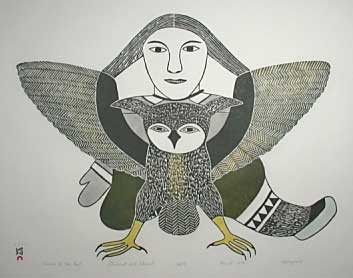
Dance of the Owl by Kenojuak Ashevak, Cape Dorset, 1978
INUIT LAUNCH HUMAN RIGHTS CASE AGAINST WASHINGTON
Sheila Watt-Cloutier, the chairwoman of the Inuit Circumpolar Conference, which represents all 155,000 of her people inside the Arctic circle, said: "We want to show that we are not powerless victims. These are drastic times for our people and require drastic measures."
The Inuit have no voice at the [Milan] conference, since they are not a nation state, but Mrs Watt-Cloutier said: "We are already bearing the brunt of climate change - without our snow and ice our way of life goes. We have lived in harmony with our surroundings for millennia, but that is being taken away from us.
"People worry about the polar bear becoming extinct by 2070 because there will be no ice from which they can hunt seals, but the Inuit face extinction for the same reason and at the same time. " --from The Guardian
8:55 AM
|
Wednesday, December 10, 2003
When he seats himself at the little writing-desk before the window looking over Bristol harbour, his hand feels as clumsy and the pen as foreign an instrument as ever before.
--J. M. Coetzee, Nobel Prize address
I cut myself yesterday on the mezzaluna. We don’t use it often, this sleek kitchen weapon with its ebony knobs and stainless steel blades. I’d taken it out of the back of a drawer in order to chop a bunch of cilantro, and as I pried the hard black plastic guard off the curved double rocker-blades I said to myself, this is a dangerous thing, and just then my little finger came up along the back blade, just so, more swiftly than a thought. At first I couldn’t tell if it was a deep cut or shallow, only that it was clean and bloodless and a quarter of an inch long. I waited, staring, in that shocked space after a sudden injury, and then ran my finger under cold water. Stinging, then nothing. I began chopping the cilantro, and then a large drop of dark red formed and I instinctively raised it to my lips. It wasn’t deep, this cut. I was lucky.
Later in the afternoon I stopped working for a while and read J. M. Coetzee’s Nobel Prize address*. Somewhere around the third or fourth paragraph, another blade descended. This one was radical and entirely bloodless. It sliced through rosy pride and accomplishment, and then through the fat yellow layers of self-doubt and apathy, right down to the blue-white bone. I’m not finished with you yet, it said. I’m not after bone, but marrow.
There’s always something to write about in the back of a drawer, and always better writing out there, waiting to cut us open, to reveal more of the stuff of which we’re made. We can squirm at the last minute, letting the blade stop in those middle layers, or give ourselves up to the knife, rejoicing in language used so well it leaves us panting, avid, undone.
All of this news of Lincolnshire his man writes in a neat, quick hand, with quills that he sharpens with his little pen-knife each day before a new bout with the page.
*thanks to Language Hat for the link
10:57 AM
|
Monday, December 08, 2003

This afternoon, looking out from the top of Killington
Today, a cloudless, warm, bright blue day. J. took off and went downhill skiing (pictures above). I went snowshoeing, and I can't begin to tell you how glorious it felt to be in the woods in twenty inches of snow, chickadees chattering overhead, champagne powder sifting down from the canopy against the dark trunks of tall white pines and sugar maples, and the snow - dazzling white in the sunlight, deep blue in the shadows - an untouched carpet interrupted only by the black, still-running brooks flowing down off the mountain.
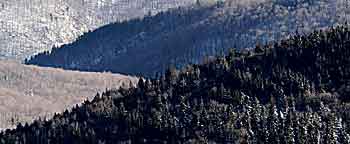
7:45 PM
|
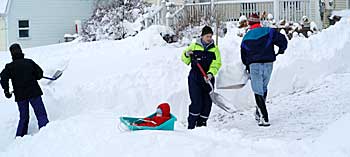
Shoveling Out.
Sunday evening's post...I forgot to switch it from "draft".
The snow continued all night: a real Nor'easter moving up the coast from the south and dumping huge quantities of snow inland. When we woke up this morning, the storm had stopped, and there were patches of pale blue in the opaque white northern sky. Reluctantly we rolled out of bed. J. made some coffee and put on his snow gear while I went up into the attic to retrieve my fuzzy turquoise fleece long-johns, purple ski pants, and heavy-duty, insulated gore-tex gloves from the "winter" storage box.
We drank the coffee and headed outside; J. for the snowblower and the driveway, me for the two snowshovels and the front porch and walk. This was around 8:30, and pretty soon the neighbors were all out there shoveling and yakking with us. Next door, our Icelandic neighbors came out with their baby daughter, in a bright red papoose-like down-filled snowsuit, for her first experience of snow.
Across the street, a young doctor who has come back east from seven years working on reservations in New Mexico was in semi-shock. His boys had gone outside this morning, all excited, only to find themselves sinking up to their necks in snow, which freaked them out. The boys had quickly adjusted; their father wasn't so sure, so we gave him the usual pep-talk: "Winter is a given here, the more you fight it, the worse it will make you feel, so you have to find ways to enjoy it, enter into it, LOVE it." He nodded, trying hard to be convinced, while watching the rest of us attack three-foot high hard-packed drifts where the plows had piled snow in front of the driveways.
We shoveled out the elderly widow's house across the street, and talked briefly to the laconic guy kitty-corner across from our house, a life-long New Englander and gifted builder/carpenter who views grass and snow with equal disdain but gets more physical work done than any of us, and does it in a faster and more efficient way. By 10 we were all pretty much dug out, and a few cars were beginning to move down the street.
It's not snowball snow, or snowman snow, it's light fluffy Christmas snow that sprays into your face when tossed upwards in a shower of diamond-dusted sparkles and is so cold and light that it stays on your eyelashes and hair like white glitter. It covers branches and evergreen without weighing them down, and falls off in a delicate curtain at the slightest touch. In a few days it will be packable, or maybe there will be rain and a crust will form, hard enough to send a sparrow sliding on its little feet across what used to be lawn. Today the sparrows were jumping happily in the barberry bush among the red fruits, each with its little cap of white. Nearby, the baby watched the snow being tossed by the busy shovels, felt the first flakes fall on her bright cheeks, gazed at us seriously with wide, unreadable eyes. Iceland gets less snow than this, and is warmer. She doesn't know that yet.
Late in the afternoon, I went to church to sing at the consecration of our newly-renovated building. The bishop showed up in a fine grey suit, clerical collar, and Sorels.
7:31 PM
|
Saturday, December 06, 2003
SNOW
We woke while it was still dark, and I got up to prowl around a bit. When I came back to bed J. asked if it was snowing yet. "I think so," I said. "The skylight is covered, and it's very still." When light came, our world had turned white overnight. And suddenly, it also felt warmer. This always happens. During the first really cold days of winter, when the ground is bare but frozen, the house feels absolutely frigid, and neither of us can warm up. Then, when snow falls, it's as if it insulates everything. I don't understand this; maybe someone can explain it to me. The thermostat reads exactly the same.
Today I went out to get the mail in my black faux fur hat, pink frou-frou scarf, jeans, and my black down jacket. There was quite a wind, and snow pelting down, but it felt terrific. Looking over the bank at the river, I saw the first frazzle ice floating rapidly downstream, like irregular sheets of translucent plastic laid on the leaden surface of the water. The beaver dam has partially washed out in the recent high waters, but below me I could see ice forming behind what was left of it. The snow -- small icy flakes -- landed on my cheeks and filled up my collar below the scarf. Walking back up the hill in four inches of snow reminded me of a recurrent dream I have where I'm walking in sand or snow, and my legs won't work at all. This wasn't that hard, but it required some effort.
Right now, beyond the window, the snow has turned to fatter flakes coming down at a steady 45-degree angle from went to east. Almost no traffic is moving. Trees, hedges, branches, roofs are iced like gingerbread; there is no color at all except for the black of trunks, windows, rooflines; the rest of the world is white.
When you've lived in this kind of climate all your life, you can usually tell how long the snow is likely to keep up from the texture, the way it is falling, and the silence or lack of it. This snowfall is going to last all day.
12:54 PM
|
Silly Christmas e-cards from BBC Wiltshire
HOW CAN WE KNOW THE DANCER FROM THE DANCE?
More on writers and their lives: A review of a new biography of Yeats, from The NY Times
William Butler Yeats made such charged and explicit use of his life, his passions, his philosophical searchings, his country and causes, and even his failings — no major poet of our time has done it so passionately and few have ever done it — that a biography could just about be constructed out of quotations.
So, almost, could the review of a biography. Starting, famously enough, with "How can we know the dancer from the dance?" Or less famously, with Yeats's remark that "poetry is born out of the quarrel with oneself."
12:36 PM
|
Friday, December 05, 2003
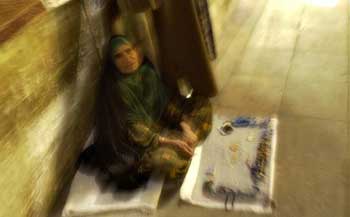
The bazaar at Kerman, Iran (from Tehran24)
A FEW LINKS OF NOTE
Photographs from French prison cells (via Conscientious).
A local review of a gallery show of women's art in Tehran (thanks, Shirin), interesting both for the art and the way the review is written.
Oh, the strange humor of British science: Ancient Fossil Penis Discovered (from today's BBC).
Not that the US is any less bizarre: Breastfeeding Driver Stuns Police, also from the BBC.
And a remarkable post, amandhla, from nehanda dreams, about AIDS, Africa, and the human need for love. Amandhla means power in zulu.
8:46 PM
|
Thursday, December 04, 2003
OOh, some disagreement over the Joy Williams quote in my last post. Good! It's such an interesting assertion she makes. Is it intended to provoke? To be taken less-than-seriously? I see two questions underneath, quite salient for writers who blog: 1) what do we, as writers, want to reveal? and 2) how much does the reader want to know about who we are?
Still quite cold here, snow, ice, shivering in the night. In ten minutes I have to go out to choir practice. It feels like an effort, that winter-kind of effort, of bundling up in layers and wrappings and running quickly to the car, across the road, into the church -- and then listening to everyone else talk about the weather. But once we start singing, it's always all right.
I've been playing the piano more lately. Twenty minutes, half an hour late at night. Bach, mostly, and some modern pieces composed by a friend. I'm out of practice. Still, it feels good to have the keys under my fingers, and time disappears.
6:42 PM
|
Wednesday, December 03, 2003
I AGREE
"If you are a poet, you will see clearly that there is a cloud floating in this sheet of paper. Without a cloud there will be no water; without water, the trees cannot grow; and without trees, you cannot make paper. So the cloud is in here. The existence of this page is dependent upon the existence of a cloud. Paper and cloud are so close."
- Thich Nhat Hahn
I DON'T AGREE
"The writer is an exhibitionist, and yet he is private. He wants you to admire his fasting, his art. He wants your attention, he doesn't want you to know he exists. The reality of his life is meaningless, why should you, the reader, care? You don't care. He drinks, he loves unwisely, he's happy, he's sick ... it doesn't matter. You just want the work - the Other - this other thing. You don't really care how he does it. Why he does it."
- Joy Williams
(both quotes via WhiskeyRiver)
4:38 PM
|
Tuesday, December 02, 2003
ECOTONE post for December 1, 2003: “Preserving Place”
For many years I’ve puzzled over the fact that some of us seem to bond with certain places, almost as if a certain landscape, certain paths, certain moments we experience within a place become imprinted upon us forever. Like parents and children, some of us bond fast, and some not at all, and some of us bond to a particular place while others are more egalitarian, spreading their affection and care evenly over all of nature.
I care deeply about the entire natural world, especially the wilderness. But there is one place on earth that seems to have a special hold on me: the land of central New York State and the area around the lake where I grew up, and my parents still live. Driving into the region, there’s a point when I feel instinctively that I'm "home". It’s something about the geology, the particular glacial understructure of the land, combined with its agricultural history, that give rise to the openness of the fields and woods and pastures that roll over the low hills, and cause streams and rivers to flow in the valleys. The lake itself is a small glacial lake of irregular shoreline. My grandfather, his business partner, and my father bought the lake and the surrounding land in the late 1950s and divided it into lots for development. Gradually houses and cabins were built on the lots, but the developers had the foresight to establish a Lake Association whose responsibility was preserving, as much as possible, the quality of the water and the character of the lake. Motorboats have never been allowed, and there are rules for what can and can’t be built, and where, and what can happen on the shoreline or in the water itself. Over the years the lot owners, a mixed-income community of people who now mostly live there full-time, have been pretty consistent in preserving the quality of life and at least sections of natural habitat, despite the construction of homes.
I remember when there were almost no houses on the lake. I was very young, and we’d go up on weekends with a picnic and sit on the shore, fishing, or make a bonfire for warmth in the evening. My grandparents built a cabin, and next to it my father and mother built, with their own hands, the house where they live today. I carried rocks, spread tar on the concrete foundation walls, climbed on the roof, found fossils and just-hatched snapping turtles in the excavated earth. While the adults worked, I explored every inch of the land near the lake and across the road in the woods. I knew where the deepest blue hepaticas bloomed in early spring, and the respectful distance to keep between myself and the weasel’s home so that he would come out, in his brown coat in summer and white in winter, to stare back curiously at this large fellow animal.
I’ve never owned a piece of land, except for the in-town lot where our house stands. In recent years, though, I’ve come to think more and more about the lake house and the woods I hope I’ll someday inherit. During a recent visit back there, I asked my father to show me the map of the undeveloped lots across the road, and then we walked along the boundaries. There were two lots, inaccessible, that had been held by other people for a long time, and during the past few months my father was able to buy them. Now the property is contiguous. It’s not large, but it is the longest stretch of undeveloped property near the lake, and it backs up on cultivated fields that are unlikely to ever be subdivided. My father told me that if I ever needed money in an emergency, there were now several excellent building lots. I’m grateful for that. But my real desire is to care for and preserve this land forever.
As I’ve thought about writing this piece, Thoreau’s phrase “In wildness is the preservation of the world” kept coming back to me. This little spot on earth is barely wild, and it may only be special to me and a few other humans, but I know that I am meant to take care of it, and to take my turn in caring for the lake itself. “In wildness” is its preservation, but also mine. I know that a part of me – perhaps a far larger part than I even realize – would die if the woods turned to grass and human dwellings, or a new generation of lot owners voted to allow motorboats and chemical weed control.
The reason for this is that wildness does not only exist in nature, but in us. We are wild too, living in bodies made of stone and earth, star and water. Our souls remember the connections, even as our minds forget; we dream of water, and branches, and sky.
7:25 PM
|
Monday, December 01, 2003
I was hoping to write an Ecotone post tonight for today's topic, 'Preserving Places". But after a day of writing other things I haven't got it in me, or rather, it's in my head, mostly, but my hands are unwilling to type it out until they and the head that animates them have had some sleep. Instead, I'm going to drink some tea, curl up in bed, and finish The DaVinci Code, which I've been devouring in big fiction-starved gulps since Sunday.
One of the best parts about blogging is coming across posts that just knock the wind out of me with a perfect phrase or a completely new idea, or make me look at myself in a totally different way. Tonight I loved Nick's latest commentary on blogging and poetry at fait accompli, and M.'s reflections on things we want to, but will never do at Mint Tea & Sympathy. At a blog that is fast becoming a new favorite, Yellowslip's prose seems like it gets more numinous every day.
And qB at FrizzyLogic, who insists she isn't that good a writer (she's not only an excellent writer but photographer to boot), wrote a personal essay on the birth of her own blog that was so sensitive, so close to the bone, and so beautifully written I read it aloud to my husband after reading it twice myself.
We're huddled in bed now with two blankets, a quilt, the heating pad and two warm laptops after a day when the sky first emitted little pieces of ice that lay on the pavement like a shower of 2-carat diamonds, and then rain, and then little opaque white pellets, and then snow, all separated by periods of brilliant sunshine. The coming of winter is painfully unpredictable here in New England, and you never know quite what it's going to be like, or how long it will last, or in what shape you'll emerge on the other side. Not unlike the birth of a blog.
10:07 PM
|
Sunday, November 30, 2003
THE FIRST SUNDAY IN ADVENT

The Annunciation: the angel Gabriel (left) speaks to Mary.
From a 6th century Ethiopian manuscript in the British Library.
I love that pointing finger - and what is Mary doing? Embroidering, maybe? It's worth searching on "annunciation" at the British Library, and comparing the 48 returned images. In nearly every case, the same subject - the angel Gabriel giving the news to Mary - is rendered in a culturally consistent manner for the audience of the time, with the pair dressed as medieval British royalty, for instance. This is not art history news, of course, but it never fails to amaze me, when, in all likelihood, Mary was a poor Palestinian girl, not unlke those of today, who would have been fortunate to have a pair of sandals and a warm cloak.
Advent, the Christian season of preparation for the celebration of the birth of Jesus, began today. Many people (including a number of Christians who see it as the sacred equivalent to the secular run-up to Christmas) don't know it is meant to be a season of atonement and reflection, not unlike Lent. Today our choir sang the great Bach chorale, "Wachet Auf!" or "Sleepers, Wake", which begins "Sleepers wake, for night is flying,/The watchman on the heights is crying/"He comes, prepare, ye virgins wise..."
I like the Biblical story of the wise and foolish virgins, the first who trimmed their wicks and kept their lamps burning, staying awake to meet their bridegroom, and the latter lazy ones who slept through the night and missed him. Jesus told this parable as a warning about his unannounced appearance on the day of judgement, but it's also just so human. Every year when this story comes around again I smile to myself: are we ever prepared for what will come, be it love, or death, or the many messages we are meant to hear and act upon throughout our lives? As the preacher said today, thank God the wake-up call doesn't only come once, but continues throughout life, so that we have many opportunities to hear who we are called to be, and finally take it to heart.
One such contemporary call is from Natalie d'Arbeloff at Blaugustine, who reminds us continually that "another world is possible". If you haven't done it yet, check out her Bloggers' Parliament and the responses of many readers.
Another wonderful Advent gift comes from Heather at Soul Food Cafe, who has prepared a virtual Advent Calendar, with one 'door' to be opened every day beginning tomorrow, Dec. 2, through Dec 26. Like everything at Soul Food, this is a labor of love packed with good writing, thoughts and ideas both for making this a rewarding an fruitful time, and especially for navigating the sometimes stormy and difficult waters of the holiday season.
5:47 PM
|
Saturday, November 29, 2003
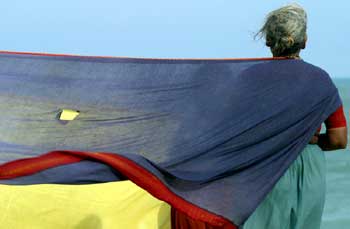
Just because it's beautiful.
More photographs of saris at PBase, via under the fire star.
After being in a place that feels like pure Americana for a few days, today I feel like I've been around the world. First there were the blogs to catch up on, and world news. After lunch J. opened a beautiful heavy pomegranate for us, filling a bowl with the glistening, crimson seeds. Then tonight I made tadik (Iranian rice with a crust) and a chicken stew with cilantro, and afterwards we watched a Vietnamese movie called "Vertical Ray of the Sun" - a most beautiful film, full of color and sensitivity, especially toward its women who move through rooms of yellow, pale blue, green and red; prepare vegetables and exotic fruits in leafy gardens; drink tea; care for children; worry; make love. What startled me most about it was the realization that I had no idea of what city life is like now in Saigon or Hanoi; my images of Vietnam are frozen in the 1960s and 1970s, and they are almost all desperately unhappy images of the countryside.
Perhaps this virtual travel to warm places is also a last refuge against the winter, which has come to beat against the windows, chilling our house by the hour until now we are ready to crawl into bed and huddle under the comforter. There have been high winds all day, and snow squalls; back in central New York, my parents report that six inches of snow are on the ground. I'm not ready!
Today, glad for their company, I paid some attention to my plants. A few inches from my hand, the Christmas cactus is in full bloom. On the windowsill, a crown of thorns, and next to them on a table, an overgrown jade plant and my rosemary bush, steadily shedding leaves as it tries to adjust to being indoors. On the coffee table there's a new addition, a big cyclamen filled with blooms so deep pink they are almost red. In a landscape that is about to become monochrome, color is imperative.
9:59 PM
|
Friday, November 28, 2003
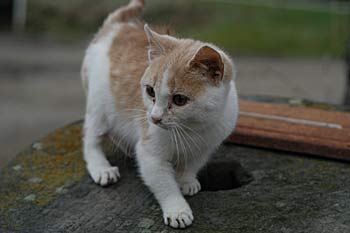
For the first time since my aunt died, several years ago, my family had Thanksgiving dinner over at the farm where she and my uncle always lived. Uncle Lee is 80 now, still strong and vigorous. He ruefully said he “didn’t work much anymore” but his self-definition apparently doesn’t include the fact that he goes to the barn every morning at 3:00 am for the first milking, and doing a good part of the plowing and planting every summer, as well as overseeing the whole operation. When I was little, I remember seeing his father, at about the same age, heading out to the barn every day in his denims and railroad hat.
The farm has 160 milking cows and a number of young heifers, and many, many acres of fine, productive land. The talk at noon ranged from recent equipment purchases, to methods of storing corn, to the recent tragedy of a neighbor who had lost a barn and 50 head in a terrible fire. One of my uncle’s hired men had gotten trampled by frightened cows. I asked how badly he’d been hurt. My uncle, a man of few words, said, “He said he remembered seein’ one hoof comin’ down on his chest.” Then he added, “When I first saw him his eyes were pretty glassy.”
“How’s he doing?” we asked (the fire was two weeks ago.)
“Oh, still kinda sore. But he’s workin’.”
“Well, what about that time you fell into the heifer pen?” someone asked. My uncle laughed and shook his head. “Oh yeah. You see all those hooves. Hurts quite a bit when they come down on ya.”
We were fifteen for dinner, and we ate in the lace-curtained living room on my aunt’s antique flow-blue china, with oval-framed photographs of my cousins hanging against the flowered wallpaper, and a picture of the farm cows on top of the television. Afterwards I washed dishes in the kitchen with my cousin’s wife, looking out the window through a lilac bush to the barn where the hired men had already arrived for milking. I dropped a white mug into the heavy aluminum pot we were using for a dishpan. It read, “Oneonta Feeds: We Love Your Cows.”
A white-and yellow barn kitten with a hurt paw limped across the lawn in front of the old chicken-shed. I had gone out earlier, stopping to play with this thin kitten, who had runny eyes and fleas but a sweet disposition, and then stood in the milking parlor for a little while to watch the big cows and the hired men and listen to the whoosh of the milking machines.
“Is this the full circle?” I wondered. “Have we gone back to the farm?” Every Thanksgiving of my childhood was celebrated in a nearby town, in the house where my parents and I lived with my grandparents, who had moved from the family farm in Beaver Meadow several decades before I was born. Now we were back on a farm, and I was soon to be in the “great”-generation when my cousin’s daughter has the first child of the next generation in February. Washing the old blue plates, and my grandmother’s silverware, I listened to the young people chattering in the next room, and remembered how old I had thought the great-aunts and grandparents were when I was young. Now, it’s me, and that's all right.
9:18 PM
|
Thursday, November 27, 2003
Usually the lake where my parents live is covered with flocks of Canada geese and, if we’re lucky, their snowy cousins, during the Thanksgiving holiday, but a combination of efforts by residents to dissuade them (boats “manned” with fake humans made out of flannel-shirted hay bales with pumpkin-heads) and fewer nearby fields planted with corn seem to have kept the flocks to a minimum this year. Because I’m a visitor now, I miss hearing their cacophony as we go to sleep at night, and watching their slow, gliding, effortless descent, feet extended: air meeting water.
Yesterday, instead, we watched a small group of mergansers playing on the lake, red heads disappearing beneath the water, white breasts flashing as they displayed and fluffed, “standing” on their feet on the surface, and then great gleeful splashes and trails as they ran and chased each other on the surface. How earthbound and heavy they made me feel!
Often the lake freezes this week, and overnight the geese are driven from the wide black expanse of the nighttime water to a diminishing open area in the center. When the flocks leave, the weak or sick geese are left behind, huddled miserably on the ice at the edges of open water, trying to gather enough strength to go south with their companions. Most do, but one or two don’t, becoming prey to illness and cold and hunger, or, rarely, surviving on corn scattered by residents. The warmer winters of late, though, have kept many flocks right here, feeding in the open, cut cornfields and spending nights on the river. Tomorrow, driving home, we’ll see more flocks, swirling like low, inky brushstrokes over the Mohawk River and Erie Canal.
Yesterday we all walked along the old railroad right-of-way in back of the woods my parents own. Behind the woods is a field, planted to alfalfa this year and cut in late summer, and beyond the field, the Chenango River. When I was here in the fall I walked over to see the beaver dam that had stopped the flow from the lake to the river. Yesterday the water level in the swamp was much lower, and water flowed over the former dam – but two small trees in the swamp seemed to have been felled recently by strong beaver teeth. It was a great walk, in the bracing air, with many stops to look at dried, split milkweed pods shedding their silvery air-boats, or pick up nuts beneath the big shagbark hickories on the edge of the woods.
7:58 PM
|
Tuesday, November 25, 2003
I'll be on the road today but should be back here tomorrow. One thing I've been thinking about, as I've considered Thanksgiving this year, is how grateful I am that I started this blog and found (or was found by) all of you.
We're all pioneers in this medium, and the growing pains we experience - the fits of doubt, the frustrations with the technology and its misuse by the unscrupulous, the occasional outbursts or hurts, the insecurities caused by comparing oneself with others, the obsessions with "stats", the sad silence when a favorite voice goes away, the feeling that maybe we should be doing something else - something "real" - with our time and talent - all these, I think, are just hardships on this wagon train over the divide between old ways of communicating and distributing words and ideas, and the new.
I've always felt the vague vestiges of pioneer stock in myself, in a particular stubborn determination to not only stick with something difficult, but to see over the next ridge. I hardly thought blogging would be that sort of a journey, but I rather think now that it is. I know it is exciting, and for me at midlife, it may be a riskier venture than putting my energy and precious writing time into traditional publishing ventures, but I am tired of that world: tired of the slowness; the predation of artists' time, ability, and emotional stamina by non-artists who control choice and distribution; the need for "credentials"; the domination of ego, fashion, and connections; the limited and limiting definitions of "success".
Ideas have so much life! They are free! They come with being human, and we're meant to discover them, express them, share them freely. What is the purpose of writing, anyway, if not to reach out into that abyss of silent space that is the perceived distance between human beings, and suddenly find another hand touching yours?
10:48 AM
|
Monday, November 24, 2003

The Pleiades. Photo by Matthew Russell
"If you want to tell me that the stars are not words, then stop
calling them stars."
- Jack Kerouac (via whiskey river)
8:58 PM
|
ITALO CALVINO
My father's road likewise led far away. The only things he saw in the world were plants and whatever had to do with plants, and he would say all their names out loud, in the absurd Latin botanists use, and where they came from - all his life he'd had a passion for studying and acclimatizing exotic plants - and their popular names, too, if they had them, in Spanish or English or in our local dialect, and into this naming of plants he would put all his passion for exploring a universe without end, for venturing time and again to the furthest frontiers of a vegetable geneology, opening up from every branch or leaf or nervation as it were a waterway for himself, within the sap, within the network that covers the green earth.
Italo Calvino, The Road to San Giovanni
I went to bed last night with "The Road to San Giovanni", the only volume of Calvino that I own. Re-reading the title essay, a memoir about Calvino's father, it struck me again as one of the most perfect essays I've encountered: it's like an apricot plucked fresh from one of his father's trees. What makes Calvino's prose so luminous? How can he write sentences that go on for a page and yet feel -- I searched for the word and he supplied it in the remark below -- weightless?
... my working method has more often than not involved the subtraction of weight. I have tried to remove weight, sometimes from people, sometimes from heavenly bodies, sometimes from cities; above all I have tried to remove weight from the structure of stories and from language." (from Six Memos for the Next Millennium, 1988)
8:28 AM
|
Saturday, November 22, 2003
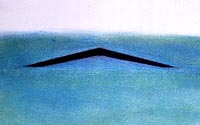
One of Maya Lin's original drawings from her proposal for the Vietnam Memorial.
Last night we watched a documentary about Maya Lin, the architect/sculptor who created the Vietnam Memorial in Washington, D.C. I've admired Lin for a long time, not only for her vision but for her sheer courage at standing up to huge pressure and criticism when she won the design contest (out of 1,491 entries) for the Vietnam memorial at the age of 20, while still a student at Yale:
"It was while I was at the site that I designed it. I just sort of visualized it. It just popped into my head. Some people were playing Frisbee. It was a beautiful park. I didn't want to destroy a living park. You use the landscape. You don't fight with it. You absorb the landscape . . .
"I though about what death is, what a loss is. A sharp pain that lessens with time, but can never quite heal over. A scar. The idea occurred to me there on the site. Take a knife and cut open the earth, and with time the grass would heal it. As if you cut open the rock and polished it."
How many of you have been to that memorial? I've gone a couple of times, and broken up each time despite my determination not to. It was the same, watching the film last night, and seeing veterans and their families standing, weeping, touching the Wall, as well as other people, like me, whose worldview was shaped by growing up during that war. Part of the brilliance of Lin's design is the way that you, and the world of trees and grass around you, are reflected in the black granite surface of the Wall, behind the litany of names. No monument with heroic mounted generals, this. The reality is inescapable: we were all in this war, we are all part of this list of names.
Reading the news I have to wonder if we have learned anything. It certainly seems that the people today wielding power have not; they are cut out of the same cloth as all rulers who have impoverished their people throughout history, and sent their young men off to fight in their wars of empire. But although it may not be apparent yet, I think people, even in this myopic country, have learned a few things. They're less trusting and more cynical about the government, and less tolerant of casualties. And I doubt they would ever accept a draft again - a draft of which we've heard the first rumblings this week. Those of you in other countries may wonder what it would take to wake this country up. That's one thing that would do it. Mounting casualties and an unwinnable war are others. Those of us who lived through Vietnam haven't forgotten what it was like.
Enough about politics! There's a pound cake and a loaf of date-nut bread in the oven, chicken marinating in a lemongrass/fish soy/brown sugar/lime/chili sauce, cilantro waiting to be chopped, and jasmine rice that needs to soak. Outside the window, the sky light is fading in that brief moment between dusk and the emergence of the first stars. As I wrote to a friend, last night the Pleiades hung over the house like a brooch pinned on velvet, Orion stretched his bow, and the Milky Way spanned the sky. Tonight should be the same. I can neither read the stars nor see my reflection in the black surface of the heavens, but it always feels as if, somehow, I'm meant to.
5:00 PM
|
Friday, November 21, 2003
ILLUSION?
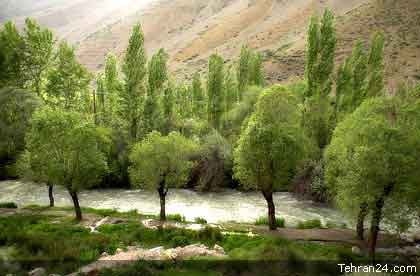
Our beautiful world. This is Karaj, Iran, in May. From Tehran24 (photos of Tehran everyday, and an archive of other locations in Iran.)
8:37 PM
|
Thursday, November 20, 2003
MR BUSH GOES TO LONDON
Yes, I know, I have repeatedly said this is not a political blog, but its hostess is actually extremely political; she's just trying to stay sane by writing about other things. So today, while our dear president is in London hiding behind unprecedented security, and Istanbul, among other locations, is exploding, let us at least join our British friends in solidarity with their protest.
Visit Coup de Vent at London and the North; she is at the demonstrations and has been posting some of her always-excellent pictures.
Blaugustine is also at the protest - no pictures yet, but I am sure she will be writing an account.
From The Guardian, 60 letters to President Bush from British and American citizens (via Conscientious).
1:07 PM
|
Wednesday, November 19, 2003
Most of my blogging time today has gone into a discussion, both on- and off-blog, of yesterday's post. So I'd like to call people's attention to the comments from yesterday, especially to the questions raised by Dale's provocative note:
Sometimes I think of the destruction of everything unmarketed and authentic is a calamity. But sometimes I think Capitalism's doing us a huge (unintended) favor: showing us the impermanence and artificiality of all worldly things. This world ain't home, and nothing makes that point more clearly, to me, than water-features and fake barns. Ludicrous attempts to make artificial homes: but not much more ludicrous than my own attempts to make my mind at home in this life. What are my attempts to surround myself with approving friends and reassuring books, but my own mental water-features and fake barns?
What do you think? Is the world "home", or are all worldly things artifical and illusionary? And depending on where you come down in that argument, what is our responsibility?
7:02 PM
|
Tuesday, November 18, 2003
ECOTONE TOPIC for November 15
How Visitors Affect Your View of Place
My earliest memory of being “visited” was a parents’ day in grade school. My parents were in our classroom, sitting along one wall near my regular seat, when I opened my flip-top desk. My father gasped. Loudly. I, of course, immediately turned bright red, and wanted to sink through the floor. He was right – my desk was a total disaster. But it was, after all, my desk. And because it was mine, and not connected to my room at home, I’d thought of it as private, not subject to the “pick-up-your-room” comments that were commonplace back in our house.
Housekeeping never did become a major priority in my life, although I like having things neat, and wish they were neater than they usually are. I did learn to pick up after myself, and am glad my parents dinned this concept into me. But I’ve always made a preferential choice when it comes to prioritizing housework, and my intellectual or creative life. It wasn’t a far step, therefore, from my second-grade desk to my adult kitchen. Shortly after I had married, I once spotted my new mother-in-law’s car pulling up outside. I quickly shoveled all the dishes from the sink into the oven, and went to calmly greet her at the door.
I do often see my personal space through the imaginary eyes of impending visitors; the cobwebs and dust become suddenly visible as well as the clutter and neglected tasks: the tiles that never made it up on the kitchen walls, the unsanded floorboards, the peeling trim on the doorframes. But I made a decision long ago that if people didn’t like me for myself, they weren’t going to be swayed by an impeccable house, nor did I want them as friends if this was how they were going to judge me.
It’s different, though, seeing the larger place where you live through people who come to visit, especially when you live in a postcard like we do. Visitors come here wanting to see the autumn leaves, or New England villages with white church steeples and narrow-clapboarded buildings; they want ducks on a river, and Christmas trees and sleigh rides; they want to drive through covered bridges and stop beside slightly ramshackle red barns with a thin heifer or two in the pasture – or, better yet, a flock of sheep - fenced in by old stone walls. Like most people who live here, we have a little “tour” that includes such sights, and satisfies guests that they’ve seen the real thing.
What they don’t know, and don’t want to know, is that in a neighboring town there is just one working farm remaining, compared to dozens a couple of decades ago. Or that the farms, residences, cemetery and dairy that lined the road between here and the university town exist now only in memory. I’ve watched them disappear, one by one, eaten up by bulldozers and their spawn: condominiums, dental offices, mail-order warehouses, upscale nurseries and farmstands bursting with pumpkins and cornstalks, a centralized elementary school. This is the new “New England” reality for the suburban and city people who move here, wanting their own piece of the country and bringing urban values and expectations that contribute inexorably to the diminution of rural life. For them a myth has replaced history: “new” stone walls, “water features” that imitate waterfalls, fake barns, pseudo-post-and-beam office buildings with white vinyl siding. A little further out into the country, new “colonial” homes sprout on five-acre sub-development plots, and older, gracious homesteads are turned into “gentleman’s farms” with Jacuzzis in the master bedroom suites, and horse barns for thoroughbreds instead of plowhorses. They exist not to impress the locals -- that would be absurd – but to impress a new crop of visitors from the city or suburb, and to convince the owner that he or she has finally “arrived”.
The disappearance of authenticity and its replacement by shallow, Disney-land theme-park imitations, no matter how expensive or detailed, makes me exhausted and sad. These concepts of “place” are dependent on the judgments of others: the visitor. They are something we can pursue if we read the right magazines, or acquire if we have enough money. They’ve become part of a marketed reality.
Maybe that’s why I like my virtual place, my blog. Here I can be fat or skinny, pimply or beautiful, neat or slovenly, and you won’t know or care. You will know, I think, if I’m telling the truth, if I’m speaking with integrity, if I’m revealing my heart. There is no authority that determines what my blog should look like, no design avant-garde to set artificial standards of chic-ness. You come here, or don’t, based on the content and based on how coming here makes you feel. It’s free, and pretty real: no games. I like that.
9:09 PM
|
Monday, November 17, 2003
A DREAM
Last night I had a dream in which I discovered a box with small, non-identical partitions wrapped on their vertical sides with shiny red paper, and inside them were small Capuchin monks wearing robes and those tight brown medieval caps with a chin-strap, sleeping. They were somewhat like little squirrels. But this was a scary dream, and I don't remember why, although in the night I swore to myself I would remember and write it down.
8:55 PM
|
WHAT EXACTLY ARE WE DOING HERE?
Poetry Chat and Blogging: Nick Piombino writes about the differences he sees between conversations in a particular poetry chat room, and blogging.
While you're there, read Nick's fascinating comments on a recent article in the London Review of Books (which I haven't gotten to yet) about Montaigne:
In discussing Hartle's book, Colin Burrow makes a point I liked very much. In saying that he feels that Montaigne is definitely not a philosopher, he makes the point that "...This does not mean, however that the *Essays* should be regarded simply as autobiographical writing. They are much more than either philosophy or autobiography, and should be thought of as belonging to a form of discourse which is more or less unnameable (unless one names it the essay), in which what is said is much less significant than the process by which it is said, and in which the movement of the mind matters more than the propositions that are advanced.
And then you might check out the speculative musings at commonbeauty about the desire for a new writing form:
I feel stirring within myself the beginnings of a manifesto, a call for a new kind of writing, maybe even a new arm of publishing that is devoted to excellent writers whose literary devotion is to a more modest project (and yet, less modest) than that of the novelist: mapping the peregrinations of their own minds.
10:46 AM
|
Sunday, November 16, 2003
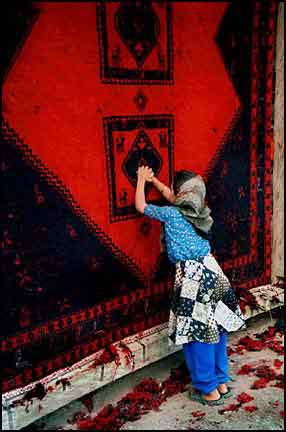
Untitled photograph by Naghmeh Jaberi, Iran, from her photo essay on the lives of women in Iran's northern provinces near the Caspian Sea.
The Ramadan dinner was a delicious adventure in Persian cooking, with fragrant chicken in turmeric, a beef and sabzi khoresh (stew of beef and green herbs), and jasmine rice with saffron, barberries, orange peel, slivered almonds, and pistachios. Then came dessert, a special and traditional saffron-flavored and colored pudding served with Iranian cookies and tea. That was when one of the guests started to talk about religion and engage the Muslims in theological debate. It gradually became apparent that he was a born-again, fundamentalist Christian (an articulate, seemingly affable and worldly man in his seventies) whose purpose in accepting the hosts' generous invitation for a special dinner was conversion.
I have never felt closer to my Muslim friends; I was appalled, embarrassed, and ultimately very angry at this man's behavior, despite the fact that we were all trying very hard to be cordial, patient and polite. I wanted to protect my friends from what felt very much like violence and great disrespect; as a result I'm sure the evening ended with him being sure I was as far from salvation as the Muslims! Thank God we have been having real interfaith dialogue, based on finding common ground, and have become good enough friends that this won't erode all the trust and friendship that has been built up over a long time. But when I called the hostess afterwards to apologize and commiserate, I couldn't deny that this was the sort of belief held by many people in the American administration today.
Before dinner, I joined the magrib prayer. My friend Shirin and I were side by side, and I felt that she was really praying for us both, since I don't understand the Arabic she was reciting, but I go through the postures with her. We both like doing this; we feel very close despite all the cultural and religious differences. I was thinking of all the Muslim friends I've been privileged to know through this relationship, especially people who have been in our local community for a year or two and then moved elsewhere or gone back to their original countries. I remembered their faces and manner with great affection. And then I felt a wave of longing for our world, for the ways in which we fail to make these bridges, to know each other as human beings, to love one another and strive for peace. I found myself asking for the strength to keep doing that as much as I can - and I was surprised to find easy tears running down my face.
When I opened my eyes, the others had gone back upstairs, and Shirin's husband was putting a new log in the woodstove at the end of the room. He looked at me with kindness. "May your prayers be answered," he said, and I thanked him, hoping the same.
It had been a much more religious experience than I had had in church this morning.
10:00 PM
|
After spending the morning in church, we're off to a Ramadan party this afternoon with our Muslim friends. I just called to ask what time they break their fast, and what time the prayers are, because I wanted to join in the prayers. Magrib, the late afternoon prayer, done at the time when the sun sets, is at about 4:25 today. My friend told me that they would be breaking the fast (with the traditional snack of dates) a little earlier, and then praying.
There's an interesting language aspect here - note that the word "magrib" is the same as "magreb", like "the Magreb", or the North Africanan states such as Tunisia and Morocco. This was where those in the original Arab world of the Middle East saw the sun setting, and thus it became the name for the coinciding prayer, one of five prayers performed every day. Maybe a native Arabic speaker can further illuminate this word for us.
In the meantime, here is a link to a fascinating account of an evening of prayer during Ramadan in Iran, by a Christian woman who, like myself, was trying to learn more about Islam.
More about today later on.
3:38 PM
|
Saturday, November 15, 2003
ON THE UP AND UP
OK, what do YOU think this expression means? I am betting that my UK readers think something different than those in the U.S., but it's not even that simple. This commentary by Geoffrey Nunberg on "Fresh Air" muses about this and other expressions which can mean something different, or even opposite, to various English speakers.
12:37 PM
|
Thursday, November 13, 2003
Over at The Coffee Sutras, Kurt has been discussing materialism and divestiture, and asking whether at midlife we come to a point where we start to want less, not more. That's certainly true for me. Several years ago, my husband and I started to consciously think about cleaning out our house (where we've lived for 25 years), lightening up, getting rid of everything that isn't important or necessary. This was also a practical decision - we realized there was no way we could ever move, downsize, swap, or rent our place and live elsewhere for a while, until we did this. Maybe it's that old, romantic hippie dream of putting a mattress in the van and setting out across the country; we both like the idea of being light on our feet and having a simple but hospitable home base.
As is probably obvious, we really like Montreal, and for us, being in a city is the contrast that we most crave at times. We're looking at various ways to satisfy those desires, and our little experiment of renting a studio apartment there last week was the first toe in the water. It had been important to be able to cook, so the place we rented had a little kitchen, or maybe I should say "kitchen". There was a fancy toaster-oven which worked all right, and a hotplate that burned out the second day we were there. After that we made our morning coffee using our travel coil after running the water as hot as we could out of the tap - but forget the pasta, soup, and steamed fresh vegetables we were expecting to make.
At home, we have a pretty big, old New England house - neither fancy nor elegant, but with plenty of room. We've done nearly all the work on it ourselves, and it's been endless -- both the renovations we've needed to make, and the ongoing maintenance of an older, not-very-well-built wooden structure in a harsh climate. Our business takes place downstairs, and we live upstairs. There's a yard in back with perennials, and a vegetable garden in back of a two-story garage/studio, a lawn to mow, trees and shrubs to prune or sometimes cut, snow to shovel, a dirt basement that's damp, ice dams to prevent.
Spending a week in a one-room apartment, on a street lined with the narrow, deep apartment buildings so typical of Montreal, was, to say the least, illuminating. Coming back home, walking through several rooms to even reach the stairs, and then climbing them to see again our spacious kitchen, living room, and bedroom immediately reminded me of the scene in Dr. Zhivago where Yuri returns from the war to his family home, only to find the same space occupied by half a dozen families. Looking down our street at the other detached, single-family houses, each with yards and porches and two floors of space, I felt more deeply than ever how luxurious even moderate living can be in this country (we live in a lower- to middle-class village in the middle of a very wealthy area). And yet, on the Montreal street where we were living, in the heart of the French section of the city, there was a wide mix of ages and everyone seemed to know each other and to be enjoying life quite fully - perhaps more than we do. A lot can be said for 99-cent baguettes, a little camembert au lait cru, available around the corner, and a pot of geraniums on the windowsill.
Could we live in less space, with fewer possessions and less comfort? Definitely. The divestiture has already begun, and it's liberating. I guess we've made a decision to trade some comfort for more choice, to use public amenities like libraries and parks rather than buying books and vacation spots, to choose a certain amount of freedom over security. We are a long way from having "only enough, and no more", and I wonder if I'd ever have the strength for that, although my definition of "enough" was never grand, and has been steadily shrinking.
What I'm discovering, most of all, is that emotional freedom and spiritual space cannot be bought at any price, and have little relationship to the physical world, once our basic needs are satisfied. It doesn't cost anything to open my mouth and sing, or hear a bird do the same.
2:43 PM
|
Wednesday, November 12, 2003
Today I finally had time to catch up on most of my favorite blogs and find out what some of my favorite people have been up to for the past couple of weeks. Also read all the responses to the Nov. 1 Ecotone topic, Coffee Shop as Place - a lot of good writing there, if you haven't read them already. (The next topic, for Nov. 15, is "How Visitors Affect Your View of Place." Rev up your mouse!)
Tonight I especially enjoyed reading Chris Clarke's vibrant account of his travels in the Mojave: the coyotes, the Joshua trees, the solitude, and coffee-drinking in a different kind of place all together. He writes:
And now the stars. How long has it been since I saw the Milky Way? A satellite zipped overhead not long ago; a spark of reflected sunlight heading from the zenith to the horizon in a minute and a half.
I sit burning fragrant juniper firewood - a casual gift from my mother a year ago - and ruminate. Dinner is eaten, dishes cleaned, tent ready for me in a few hours.
I miss Becky and Zeke. Cassiopeia smiles sweetly at brilliant Mars.
When we arrived back home from Montreal, the first thing I noticed when I got out of the car was Mars. And then the stars, and the Milky Way. It's so dark here in the village that you can see the Milky Way on any clear night, right from the skylight in the bedroom. I'm nearsighted, and sometimes, on an especially brilliant night, I put on my glasses if I get up in the middle of the night, just to take a sharp look at the sky filled with stars.
While I was in the seductive city, enjoying nights when people are up to all hours procuring just about anything they might want, I also considered that beyond its edges we might have been able to see the northern lights. I didn't think about the stars, per se, dazzled as I was by the city lights, but in any case, you can't see them. Coming home to our quaint village, already pretty dark by 6 pm, life seemed pretty sleepy and monochromatic, but I felt a surge of recognition and welcome when I looked up overhead. I might not miss the provincialism of this place if we lived elsewhere, but I can tell you one thing - I'd sure miss the stars.
7:40 PM
|
Tuesday, November 11, 2003
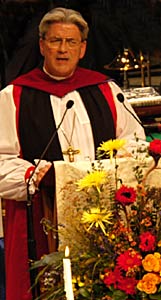
Rt. Rev. Douglas Theuner, current Bishop of New Hampshire
DEFINING MOMENTS IN THE CHRISTIAN LIFE: Consecration of Gene Robinson, continued.
(I don't know if it's necessary to say this, but these posts and photographs about the consecration are drafts and excerpts from a longer work, and they are copyrighted. I appreciate links very much, but ask you to please not reprint or publish any of this work without contacting me. Thanks.)
After the objectors had been heard and acknowledged, the Presiding Bishop asked if it was the will of the people to ordain Gene as bishop, and was answered with a resounding “That is our will!” He asked if we would uphold Gene as bishop, and again the people answered, “We will.” Then followed prayers and readings, and then the current Bishop of New Hampshire, Douglas Theuner, came to the lectern for the sermon.
Although I don’t know Bishop Theuner personally, I’ve seen him in action for years, heard him speak on many occasions, and worked with him during my years on my parish vestry. He gets kidded a lot about his unique and luxuriant hair (Barbara Harris, at a celebration of Bishop Theuner’s ministry earlier this fall, quipped that “he has a better hair-do than I do!”) and his booming voice, which can easily cut through a noisy convention hall. He is a tall, distinguished, handsome, energetic and authoritative figure, despite two serious heart operations in recent years. I think Gene Robinson was right when he said, “Doug takes the office of bishop seriously, but not himself.” I was astounded to hear some close associates greet him with a jocular “Hello, Your Eminence!” when he walked into a meeting; the bishop didn’t miss a beat but came back with a big laugh and fast rejoinder of his own.
Bishop Theuner has always been a progressive, never lacking in the courage to take risks. When I asked Gene, during an early meeting, “Why you, why now, why New Hampshire?” he replied, “The answer to all of those questions is ‘Douglas Theuner’.” Gene flatly states that after he came out as a gay man, he thought his ordained life in the church was over. But seventeen years ago, Doug Theuner hired him to be his assistant, at a time when there were no openly gay priests serving at that level anywhere in the church. (To keep the courage of this appointment in perspective, bear in mind that the heresy trial of the Rt. Rev. Walter Righter, Bishop of the Diocese of Newark, New Jersey, for knowingly ordaining a non-celibate gay man to the priesthood, took place in 1996, only 7 years ago. Seven of the nine bishops on the “ecclesiastical court”, one of whom was Bishop Theuner, heard the accusations and voted to dismiss the charges against Bishop Righter, writing that “neither the doctrine nor the discipline of the Church currently prohibit the ordination of a non-celibate homosexual person living in a committed relationship.”)
Bishop Theuner is one of the most impressive speakers – one is tempted to say “orators” -I’ve ever heard. He can deliver extemporaneous prayer that is mind-boggling in its ease, breadth, and beauty, but in the pulpit he’s in his true element. The sermon for Gene’s consecration was the only one I’ve ever heard him give from a prepared text, let alone substantial notes, and it was an example not only of his homiletic gifts but a declaration of his theology and vision for the Church in the future.
St. Francis of Assisi is supposed to have said, “Preach the Gospel at all times. If necessary, use words.” But how often do priests, let alone bishops, really preach the true Gospel that Jesus taught and lived – a message of humility before God and one’s fellow human beings, the equality of all persons, simplicity of spirit and living, and compassion toward all beings and the world? I once asked a priest, someone I knew to hold very progressive views about politics and theology, why we so seldom heard a sermon about the church’s responsibility for social justice. “You know why,” she retorted. “Because throughout history, prophets keep getting offed.”
On this occasion, though, Bishop Theuner seized the moment and without hesitation took on his own religious establishment, preaching a prophetic, courageous, moving, often funny, and inspiring sermon about our true call as Christians:
…And what is that Gospel of Christ which a bishop is to “boldly proclaim and interpret”? In preparation for this sermon I re-read the four gospels… specifically with a view toward discovering anew what they tell us of Him …who sought, as our new bishop will be charged to seek, to “show compassion to the poor and strangers, and defend those who have no helper.” And that, I rediscovered, was the entire focus of His ministry.
…Our Lord’s attention was entirely directed to the outcast and the marginalized; the poor, the halt, the lame, the blind, lepers, women, people possessed with demons, prostitutes, tax collectors, Roman soldiers, Samaritans, Syro-Phoenecians , thieves..... His wrath was reserved for the members of the religious establishment of his own faith community; Pharisees and Saduccees, scribes, elders and chief priests, money changers in the temple....and his own chosen disciples. And now we seek to incorporate a new member into the religious establishment of our time; to make him a bishop, a modern day chief priest... They were chastised by our Lord because they thought people were made for their religious establishment; not their religious establishment for people. They were condemned because they loved to go about in long robes, and loved salutations in the marketplaces and the best seats of honor in houses of worship and the places of honors at feasts...and for a pretense made long prayers...... Who are we kidding? Look around us! Have we met the enemy and found out that they are us?
The booming voice paused for dramatic effect. And, to their credit, the gloriously-robed “high priests”, who he had just “caught”, smiled and nodded knowingly, acknowledging the truth of these words.
In this time when the culture of violence seems to be all-pervasive, the disagreement over your election and consecration has been labeled by one of your detractors as “the defining BATTLE in the WAR for Anglicanism’s soul.” – Well, guess what? IT ISN’T! – I am quite sure that since the Holy Spirit came upon our apostolic forebears in an upper room in Jerusalem, no “defining” moment in the Christian life has ever taken place in a by-invitation-only gathering of ecclesiastical nabobs. Not in Concord, not in Minneapolis, not in Dallas, not in London, not in Rome, not even in Durham. New Hampshire!
Bishop Theuner's examples of "defining" moments in the Christian life were a church community giving enough
love and support to an abused woman to give her a sense of her own worth, and the strength and help to stand up for herself; the love and acceptance of a young man unsure of his sexual orientation; and a slum landlord being moved to treat people fairly and to “respect the dignity of every human being".
He spoke about the great need, if we are going to really mean what we say when we talk about welcome and inclusivity, for the “center” (of privilege and comfort and power) to move to the “margins”. Does “unity” mean excluding certain people for the sake of an institution, or does unity the equality and dignity of all people?
“Because of who you are, Gene,” he said, “You will stand as a symbol of unity in the church in a way none of us can.”
And then he talked about what this consecration was really about: the “raising up one of our own… to lead us through this world of violence and anger and into God’s coming reign of acceptance and forgiveness.”
(If anyone would like to read the full text of Bishop Theuner’s sermon, it’s available as a .pdf file. If you have trouble downloading it, right-click on the link and choose “save target to…” to save the file in your own directory.)
6:11 PM
|
Sunday, November 09, 2003
SOME MONTREAL IMAGES
(all photographs by J.)
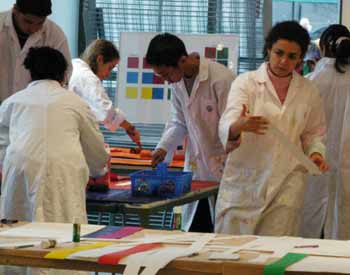
Art class, contemporary museum of art
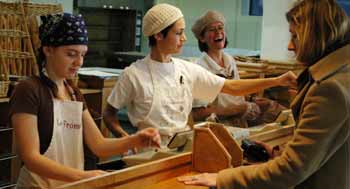
Boulangerie

Fall leaves in Parc LaFontaine

Today's lunch
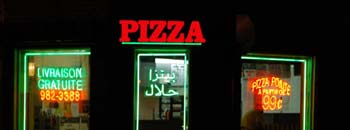
Pizza Mont Royal
10:54 PM
|
Saturday, November 08, 2003
It looks like most of my readers have been very loyal during the serialized narrative about Gene Robinson’s consecration, but I thought a digression from religion and politics would be welcome (for me, too). So here is a response, very belatedly, to the
ECOTONE TOPIC for November 1, 2003: COFFEE SHOP AS PLACE
Back home, I don’t go to coffee shops. There aren’t many, to begin with, and those that exist fall into the categories of “self-consciously-hip-and-pretending-to-be-urban”, or “here-we-are-in-a-mall-looking-at-books-let’s-have-latte”. Neither appeals. I prefer the atmosphere of a greasy diner, actually, with truck drivers and lumbermen next to bikers and local sad-sacks, all downing their java in shoulder-to-shoulder silence at the long stainless-steel counter. I’d rather sit in the Polka Dot, next to the train tracks, writing and drinking coffee, than go to the hip joints with the rural yuppies and artsy types who seem so desperate to bring Boston and Manhattan to rural New England.
But when I’m here, in Montreal, I’m in a city filled with bistros and cafes, with bookstores-avec-espresso; upstairs aeries for people-watching and chic basements for warmth and escape; internet cafes; outdoor spots for rendezvous and long afternoons. No city in North America can claim better food, although most can claim better weather. So I have my choice, but I keep going back to one little lunch/breakfast/café in particular.
It doesn’t have a name, or at least I don’t know it. It’s near the internet place I used to use, and I went in the first time to have some coffee in the middle of the afternoon, and immediately saw that the food in the small, refrigerated display case was all Middle Eastern, and homemade. There was shish taouk, fresh falafel, and spinach piestudded with sesame; bread with fresh zatar; and an array of homemade vegetable salads: taboulleh, cauliflower, beet, carrot, lentil, beans and chick peas – un plat, trois choix. And there was baklava. Not many things, but good ones. The grey-haired proprietor, a man of 40 or 45, didn’t look Arab or Persian or Greek or Armenian; I decided finally he might be Turkish. I ordered a café au lait, and he made it for me, and set the white china cup and saucer on the counter. Then I realized I only had a $20. He looked – disgusted. I apologized, embarrassed. He took it, made change, and turned away.
I drank the coffee, which was delicious, at one of the small marble-top tables arranged along the windows, trying surreptitiously to watch him. He spoke several languages, but to the patrons, mainly French. He rarely smiled, and at one point engaged in a heated argument with a North African reading a newspaper, but then they both broke out laughing. I had finished and needed to leave, so I put my cup on the counter, said “shukran” and left, getting barely a nod.
The next day I brought J. there for lunch. We ate shish taouk, in paper-thin lavash lightly grilled after the sandwich was made – fantastic - and some of the salads. But that day a new wrinkle appeared: the proprietor’s wife. She was very young, with a lovely face, wearing grey pants and a matching long tunic and her head and shoulders wrapped in a white veil. She worked behind the counter and moved back and forth between the café and the kitchen while her husband waited on customers. She never looked at the men, but kept her eyes down. I immediately liked her and wondered about her, with not a little concern – where had she come from? What was her life like? Did they have children? Had she left her parents and family halfway around the world? Was she happy? There was a door on the far end of the café that opened onto a little garden with nice trees, but there were no tables out there for eating. I wondered if she went out there and sat when she had a moment; I hoped so.
I’ve been back a number of times, and the wife is rarely there, but when she is, she smiles shyly at me and acknowledges my feeble Arabic greetings and thanks. I’m so obviously non-Muslim, but I don’t want to offend, even though they must be used to it; I put on my sweater on hot days and check to see if too much skin is showing, which, of course, it always is. This time, after several months away, J. and I went in for lunch and coffee, and the proprietor nodded his head and gave a small smile of recognition. “I think it’s better when you’re with me,” I told J. The food was great, and the coffee even better.
I guess the thing that keeps us going back to such places is that we’re equally drawn by the quality of the food or drink, and the mutual untold story. Cafes are not bars where everything hangs out and personal stories run freely out of people’s over-lubricated minds. In cafes you see other habitués, and you wonder about them, but there is discretion and distance. (Matisse went to a café frequented by many other artists every day for years, and no one ever came to sit with him, so respectful were they of his air of private dignity – Francoise Gilot mentions that this actually hurt Matisse.) I want to discover the stories, but I won’t ask. I also want, I suppose, to become regular enough that perhaps they will wonder about me. It is a game, perhaps, a gentle human game of curiosity, hunger, thirst: all satiable for a moment, but bound, like us, to return tomorrow.
6:33 PM
|
|
|